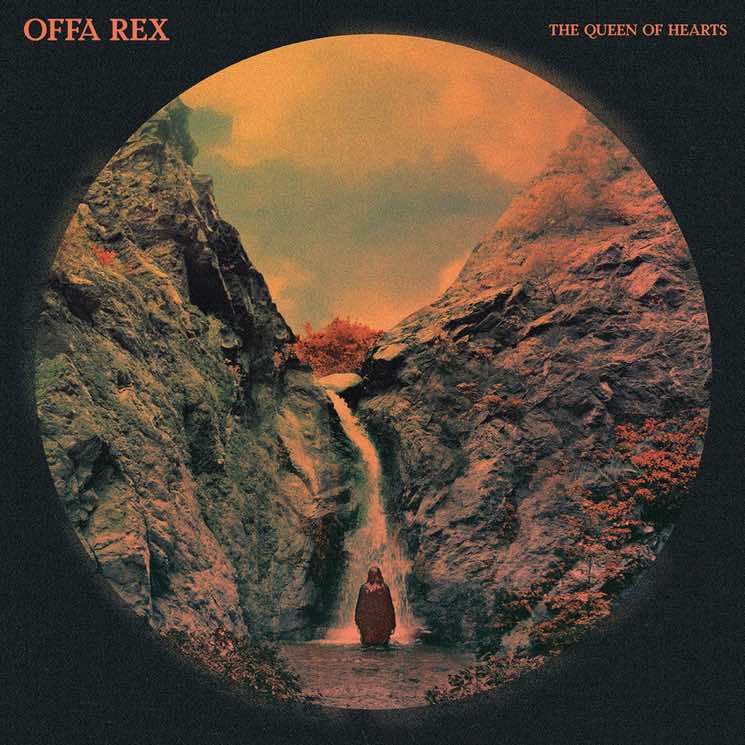It's been a good few years for pan-Atlantic folk collaborations. In 2015, the Mekons and Robbie Fulks went to Jura to record an album of sea shanties, and last year Billie Bragg and Joe Henry made Shine a Light on board trains from Chicago to Los Angeles.
And now, Portland indie rockers the Decemberists — who have always sounded like Anglophiles and have cited Anne Briggs, Nic Jones and Shirley Collins as influences — have teamed up with a British songwriter to make a record indebted to the '60s British folk revival.
The Decemberists' Colin Meloy struck up a Twitter correspondence with singer and multi-instrumentalist Olivia Chaney after hearing her debut album, The Longest River. That led to touring together and, eventually to Offa Rex, the band's collaboration with Chaney.
Recorded live to tape in Portland by Tucker Martine, The Queen of Hearts sees Chaney, at the Decemberists' invitation, carrying well-loved British folk songs back to America and dusting them off with a delightfully non-purist backing band. Like a lot of great records, it's imbued with the magic of hearing the musicians and the singer mid-process of figuring things out or having just nailed it.
Not that it lacks seriousness or austerity. Chaney's voice is as stately, clear and strong as it is beautiful, and you can hear in her interpretations that she is standing on the shoulders of Steeleye Span's Maddy Prior, June Tabor, Lal Waterson and especially Anne Briggs.
On some tunes, the band rocks it up a notch or two beyond where Steeleye Span had; "Sheepcrook," for instance, sounds like a nod to Black Sabbath, and "Blackleg Miner" jumps out Pogues-ishly with loud, up-close juice harp; "Bonnie May," similarly, sounds powerfully psychedelic. Yet despite being backed up by a folk rock band, many of The Queen of Hearts' best moments are the most minimally accompanied — Chaney's take on "The First Time Ever I Saw Your Face," for example, a hybrid Roberta Flack/Peggy Seeger version, is just Chaney's clear and sensitive voice soaring over her undulating harmonium.
Spending time with this dreamscape of a collection — and it's definitely worth spending time with — unveils themes of masculinity and, especially, femininity, all the quiet dangers associated with womanhood, whether it's "Flash Company" or the complex dynamic between rapist and pregnant victim in "Bonnie May." The Queen of Hearts points playfully to female empowerment, too, in songs like "The Gardener," the gardener's ornate advances being met with just as ornate a rebuttal; in spellbinding standout track "Willie O'Winsbury," the princess wins both man and "as much land as she'll ride in a long summer's day."
The record also reminds us, in a timely manner, of the Watersons; Offa Rex do a honky-tonk version of "Old Churchyard" and end adventurously with a jazzy experimental piano exploration of "To Make You Stay," from Lal and Mike Waterson's soon to be reissued 1972 album, Bright Phoebus.
(Nonesuch)And now, Portland indie rockers the Decemberists — who have always sounded like Anglophiles and have cited Anne Briggs, Nic Jones and Shirley Collins as influences — have teamed up with a British songwriter to make a record indebted to the '60s British folk revival.
The Decemberists' Colin Meloy struck up a Twitter correspondence with singer and multi-instrumentalist Olivia Chaney after hearing her debut album, The Longest River. That led to touring together and, eventually to Offa Rex, the band's collaboration with Chaney.
Recorded live to tape in Portland by Tucker Martine, The Queen of Hearts sees Chaney, at the Decemberists' invitation, carrying well-loved British folk songs back to America and dusting them off with a delightfully non-purist backing band. Like a lot of great records, it's imbued with the magic of hearing the musicians and the singer mid-process of figuring things out or having just nailed it.
Not that it lacks seriousness or austerity. Chaney's voice is as stately, clear and strong as it is beautiful, and you can hear in her interpretations that she is standing on the shoulders of Steeleye Span's Maddy Prior, June Tabor, Lal Waterson and especially Anne Briggs.
On some tunes, the band rocks it up a notch or two beyond where Steeleye Span had; "Sheepcrook," for instance, sounds like a nod to Black Sabbath, and "Blackleg Miner" jumps out Pogues-ishly with loud, up-close juice harp; "Bonnie May," similarly, sounds powerfully psychedelic. Yet despite being backed up by a folk rock band, many of The Queen of Hearts' best moments are the most minimally accompanied — Chaney's take on "The First Time Ever I Saw Your Face," for example, a hybrid Roberta Flack/Peggy Seeger version, is just Chaney's clear and sensitive voice soaring over her undulating harmonium.
Spending time with this dreamscape of a collection — and it's definitely worth spending time with — unveils themes of masculinity and, especially, femininity, all the quiet dangers associated with womanhood, whether it's "Flash Company" or the complex dynamic between rapist and pregnant victim in "Bonnie May." The Queen of Hearts points playfully to female empowerment, too, in songs like "The Gardener," the gardener's ornate advances being met with just as ornate a rebuttal; in spellbinding standout track "Willie O'Winsbury," the princess wins both man and "as much land as she'll ride in a long summer's day."
The record also reminds us, in a timely manner, of the Watersons; Offa Rex do a honky-tonk version of "Old Churchyard" and end adventurously with a jazzy experimental piano exploration of "To Make You Stay," from Lal and Mike Waterson's soon to be reissued 1972 album, Bright Phoebus.
